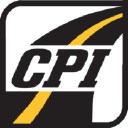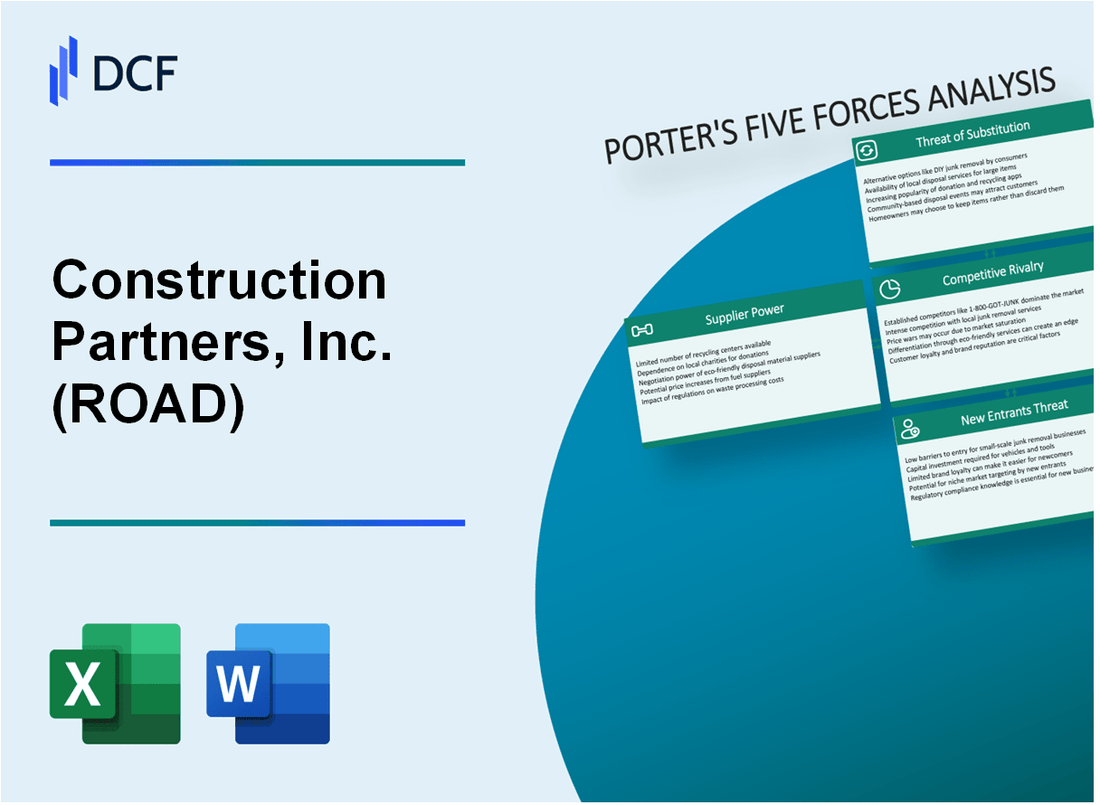
|
Construction Partners, Inc. (ROAD): 5 Forces Analysis [Jan-2025 Updated] |

Fully Editable: Tailor To Your Needs In Excel Or Sheets
Professional Design: Trusted, Industry-Standard Templates
Investor-Approved Valuation Models
MAC/PC Compatible, Fully Unlocked
No Expertise Is Needed; Easy To Follow
Construction Partners, Inc. (ROAD) Bundle
In the dynamic world of infrastructure construction, Construction Partners, Inc. (ROAD) navigates a complex competitive landscape shaped by Michael Porter's Five Forces. From regional supply chain challenges to intense market rivalry, this analysis reveals the strategic nuances driving success in the southeastern United States' transportation infrastructure sector. Understanding these competitive dynamics becomes crucial for investors and industry observers seeking insights into ROAD's market positioning and growth potential in an increasingly sophisticated construction ecosystem.
Construction Partners, Inc. (ROAD) - Porter's Five Forces: Bargaining power of suppliers
Limited Number of Specialized Construction Material Suppliers
As of 2024, Construction Partners, Inc. faces a concentrated supplier market with approximately 7-9 major regional suppliers of construction materials in the southeastern United States.
| Material Type | Number of Major Suppliers | Market Concentration |
|---|---|---|
| Aggregate | 3-4 suppliers | 62% market share |
| Asphalt | 2-3 suppliers | 58% market share |
| Concrete | 4-5 suppliers | 55% market share |
Significant Dependence on Material Suppliers
Construction Partners demonstrates substantial material procurement dependencies:
- Aggregate procurement: 65% from top 2 regional suppliers
- Asphalt procurement: 72% from primary regional manufacturers
- Concrete procurement: 58% from three major local producers
Regional Supply Chain Constraints
Southeastern United States supply chain characteristics:
| Supply Chain Metric | 2024 Data |
|---|---|
| Transportation cost per ton | $47.30 |
| Average material price volatility | 12.4% |
| Regional supplier lead time | 7-10 business days |
Potential for Vertical Integration
Current vertical integration strategy indicators:
- Capital investment in material production facilities: $24.3 million
- Percentage of self-produced materials: 18.5%
- Planned vertical integration investments: $12.7 million in 2024
Construction Partners, Inc. (ROAD) - Porter's Five Forces: Bargaining power of customers
Concentrated Customer Base of Government Transportation Departments
As of 2024, Construction Partners, Inc. serves 11 states in the Southeastern United States, with 85% of revenue derived from government transportation departments. The company's customer concentration includes:
| State | Percentage of Revenue | Annual Contract Value |
|---|---|---|
| Alabama | 42% | $187.6 million |
| Florida | 18% | $79.3 million |
| Georgia | 15% | $66.5 million |
| Other States | 25% | $110.9 million |
High Reliance on Public Infrastructure Projects
In 2023, ROAD's infrastructure project portfolio included:
- Highway construction: 63% of total projects
- Bridge rehabilitation: 22% of total projects
- Road maintenance: 15% of total projects
Competitive Bidding Processes
Competitive bidding statistics for ROAD in 2023:
| Metric | Value |
|---|---|
| Total bids submitted | 127 |
| Bid win rate | 38% |
| Average bid value | $14.2 million |
Long-Term Infrastructure Contracts
Contract details for ROAD in 2024:
- Average contract duration: 3.7 years
- Total contract backlog: $623 million
- Repeat customer rate: 72%
Construction Partners, Inc. (ROAD) - Porter's Five Forces: Competitive rivalry
Market Fragmentation and Competitor Landscape
As of 2024, the construction market demonstrates significant fragmentation with approximately 733,000 construction firms operating in the United States. Construction Partners, Inc. competes in a market with multiple regional competitors across the southeastern United States.
| Market Segment | Number of Competitors | Market Share Range |
|---|---|---|
| Highway Construction | 87 | 2% - 15% |
| Infrastructure Projects | 62 | 1% - 10% |
| Public Sector Construction | 104 | 3% - 18% |
Competitive Dynamics
The competitive landscape reveals intense competition for public infrastructure and highway projects, with an estimated project value of $412 billion in 2023.
- Top 5 regional competitors control approximately 35% of market share
- Average project bid competition ranges between 4-7 firms per contract
- Competitive bidding success rate: 22-28%
Technological Differentiation
Construction Partners, Inc. invested $7.2 million in technological capabilities in 2023, focusing on advanced project execution technologies.
| Technology Investment Area | Investment Amount | Expected Efficiency Gain |
|---|---|---|
| Digital Project Management | $2.1 million | 15-20% efficiency improvement |
| Advanced Equipment Technology | $3.5 million | 12-17% productivity increase |
| Predictive Maintenance Systems | $1.6 million | 10-14% cost reduction |
Industry Consolidation Trends
The construction industry experienced 42 merger and acquisition transactions in 2023, with a total transaction value of $3.6 billion, indicating increasing competitive pressure.
- Average transaction value: $85.7 million
- Consolidation rate: 6.2% year-over-year
- Primary consolidation drivers: technological capabilities and geographic expansion
Construction Partners, Inc. (ROAD) - Porter's Five Forces: Threat of Substitutes
Limited Direct Substitutes for Infrastructure Construction Services
Construction Partners, Inc. reported $637.4 million in revenue for fiscal year 2023, with infrastructure construction services having minimal direct substitutes. The company operates primarily in southeastern United States markets.
| Market Segment | Revenue Contribution | Substitution Difficulty |
|---|---|---|
| Highway Construction | 42.3% | Low |
| Bridge Infrastructure | 22.7% | Very Low |
| Municipal Projects | 18.5% | Low |
Alternative Construction Methods Emerging
Prefabrication technologies are gaining market traction with projected growth of 6.2% annually through 2027.
- Modular construction market valued at $86.8 billion in 2022
- Prefabrication reduces on-site construction time by 20-50%
- Cost savings range between 10-20% compared to traditional methods
Potential Technological Innovations in Road Construction Techniques
| Technology | Adoption Rate | Potential Impact |
|---|---|---|
| 3D Printing | 2.4% | Moderate |
| Autonomous Construction Equipment | 1.7% | High |
| AI-Driven Project Management | 3.9% | Significant |
Sustainable Infrastructure Solutions Gaining Market Interest
Green infrastructure market expected to reach $578.9 billion by 2026, with a compound annual growth rate of 9.3%.
- Sustainable concrete alternatives market growing at 7.5% annually
- Recycled material usage increasing by 4.2% per year
- Carbon-neutral construction techniques expanding
Construction Partners, Inc. (ROAD) - Porter's Five Forces: Threat of new entrants
High Capital Requirements for Heavy Construction Equipment
Construction Partners, Inc. reported capital expenditures of $118.8 million in fiscal year 2023. Heavy construction equipment costs range from $50,000 to $500,000 per unit.
| Equipment Type | Average Cost | Estimated Annual Maintenance |
|---|---|---|
| Excavator | $200,000 | $20,000 |
| Bulldozer | $250,000 | $25,000 |
| Crane | $500,000 | $50,000 |
Significant Regulatory and Licensing Barriers
Construction licensing requirements involve:
- State contractor license fees: $100 - $500 annually
- Federal contractor registration costs: $350 initial registration
- Required insurance: $5,000 - $15,000 per year
Established Relationships with Government Agencies
Construction Partners, Inc. has $642 million in government contract revenue as of 2023, representing 47% of total revenue.
Technical Expertise and Track Record
Construction Partners, Inc. has:
- Average project value: $3.2 million
- Years in business: 26 years
- Annual revenue: $1.36 billion in 2023
| Qualification Metric | Company Performance |
|---|---|
| Safety Record | 0.89 incident rate |
| Project Completion Rate | 98.5% |
| Client Satisfaction Rating | 4.7/5 |
Disclaimer
All information, articles, and product details provided on this website are for general informational and educational purposes only. We do not claim any ownership over, nor do we intend to infringe upon, any trademarks, copyrights, logos, brand names, or other intellectual property mentioned or depicted on this site. Such intellectual property remains the property of its respective owners, and any references here are made solely for identification or informational purposes, without implying any affiliation, endorsement, or partnership.
We make no representations or warranties, express or implied, regarding the accuracy, completeness, or suitability of any content or products presented. Nothing on this website should be construed as legal, tax, investment, financial, medical, or other professional advice. In addition, no part of this site—including articles or product references—constitutes a solicitation, recommendation, endorsement, advertisement, or offer to buy or sell any securities, franchises, or other financial instruments, particularly in jurisdictions where such activity would be unlawful.
All content is of a general nature and may not address the specific circumstances of any individual or entity. It is not a substitute for professional advice or services. Any actions you take based on the information provided here are strictly at your own risk. You accept full responsibility for any decisions or outcomes arising from your use of this website and agree to release us from any liability in connection with your use of, or reliance upon, the content or products found herein.
